Key takeaways:
- Productivity guides should be approached thoughtfully, accommodating individual needs and experiences rather than being followed blindly.
- Setting clear goals provides direction, allows for tracking progress, and offers motivation during challenging times.
- Evaluating productivity progress is vital for understanding effectiveness, celebrating small wins, and maintaining alignment with goals.
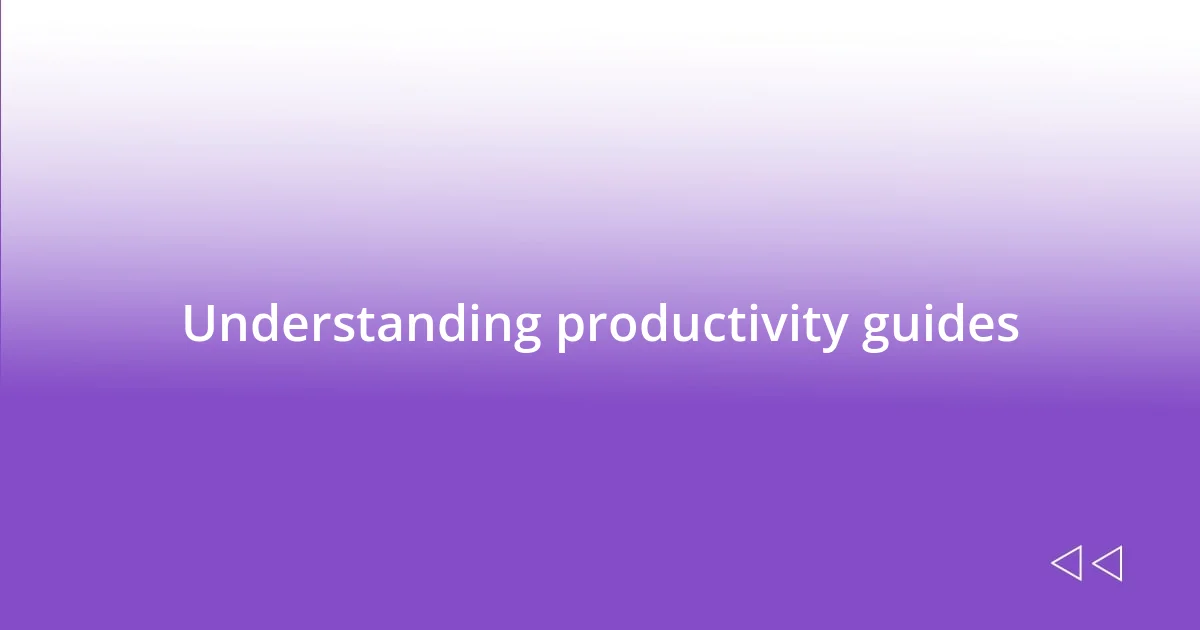
Understanding productivity guides
Productivity guides are often crafted to help us navigate our busy lives and find the most efficient paths toward our goals. I remember the first time I stumbled upon one—it promised to transform my chaotic work routine into a streamlined success machine. But as I delved deeper, I started to wonder: is there really a one-size-fits-all approach to productivity?
At their core, these guides aim to offer strategies and techniques tailored to various personalities and lifestyles. For instance, I discovered that while time-blocking worked wonders for some, it felt stifling to me. Have you ever tried a method only to find it completely counterproductive? It’s like searching for the right key to unlock a door; sometimes, it just takes a little trial and error to find the one that fits.
What I find fascinating is how productivity guides often mirror our internal struggles. The quest for efficiency can stir feelings of inadequacy or overwhelm. I’ve certainly felt that rush of guilt when I can’t keep up with the latest trends or tips. Isn’t it interesting how these emotions can shape our relationship with productivity? It’s essential to engage with these guides thoughtfully, integrating what resonates with our unique journeys rather than blindly following every trend.
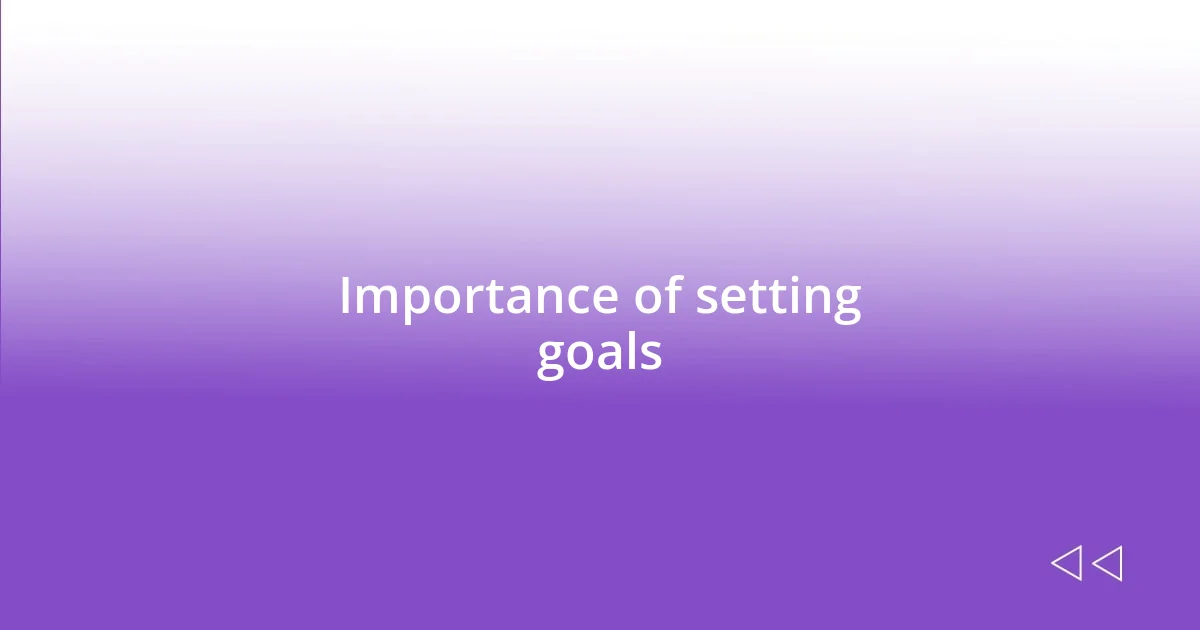
Importance of setting goals
Setting goals is crucial for channeling our energy into meaningful actions. I’ve often found that when I have clear objectives, it’s like having a map for a road trip. You wouldn’t just drive aimlessly, right? Without goals, it’s easy to feel lost, wandering from task to task without any sense of direction or purpose.
Establishing goals also helps in measuring progress and celebrating small victories along the way. I remember when I set a goal to read a certain number of books in a year. Tracking my progress turned it into a fun challenge, and each finished book felt like a win. Wouldn’t it be satisfying to know that you’re moving forward, even if sometimes it feels slow?
Furthermore, goals provide motivation during those inevitable tough times. There have been days when my motivation waned, perhaps due to fatigue or external stressors; it was during these moments that my goals reminded me why I started in the first place. Goals act as a beacon, guiding us back on course when we stray.
| Aspect | Importance of Setting Goals |
|---|---|
| Direction | Provides a clear path to follow |
| Measurement | Allows for tracking progress |
| Motivation | Inspires perseverance through challenges |
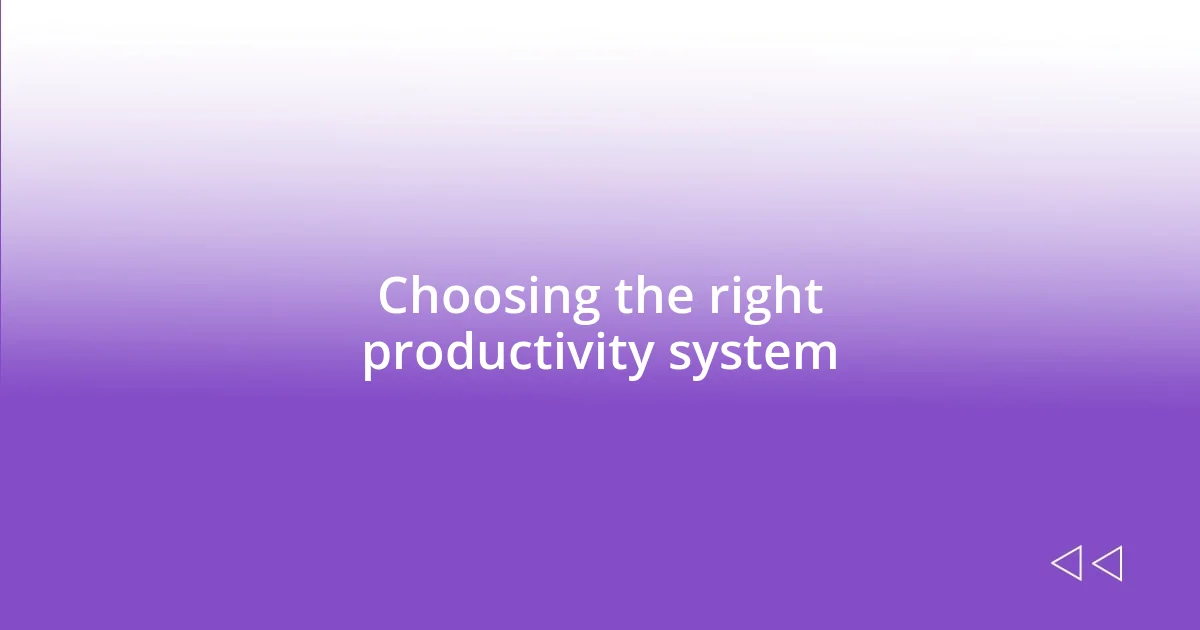
Choosing the right productivity system
Choosing the right productivity system can feel like navigating a dense forest, filled with various paths but no clear trail. I remember experimenting with a bullet journal for a while, thinking it would boost my organization. However, I realized that the intricate layouts and constant updates soon overwhelmed me, leading to more frustration than liberation. The key takeaway for me was this: a system that works wonders for someone else may not be the best fit for you.
Here are a few tips to help you choose wisely:
- Reflect on your needs: What areas do you want to improve?
- Test different methods: Try out a few systems on a trial basis to see what feels right.
- Stay flexible: Adapt your system as your needs evolve; it’s okay to change paths.
- Seek simplicity: The less complex the system, the easier it is to maintain consistency.
- Listen to your emotions: If a system feels burdensome, it likely isn’t the right fit for you.
Finding the right productivity toolkit shouldn’t feel like a chore; rather, it should feel like an empowering journey toward efficiency. Through the process, I encourage you to embrace the discoveries along the way. Each misstep brings you closer to understanding what resonates with your unique workflow.
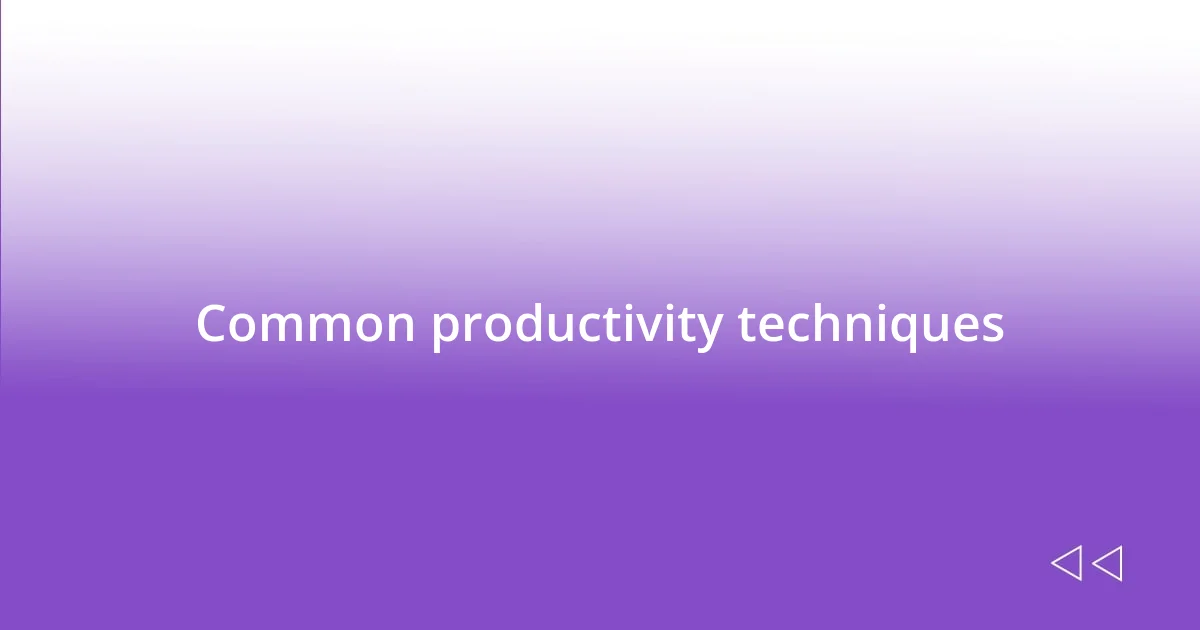
Common productivity techniques
When it comes to productivity techniques, the Pomodoro Technique is one I’ve frequently turned to. It’s a simple yet effective method where you work for 25 minutes, then take a 5-minute break. This structured approach not only keeps my focus sharp but also allows my mind to recharge, preventing that dreaded burnout. Have you ever noticed how taking short breaks can rejuvenate your concentration? It truly makes a difference!
Another popular technique I’ve tried is time blocking. I remember blocking out specific chunks of my day for different tasks, like writing, meetings, and personal projects. Initially, it felt constraining, but once I embraced it, I found a rhythm that helped me make significant progress. Do you struggle to find time for everything on your plate? Time blocking might just help you create that structure you’re missing.
I’ve also explored the concept of the two-minute rule, which suggests that if a task will take less than two minutes to complete, you should do it right away. Implementing this rule has helped me chip away at small tasks that would otherwise linger on my to-do list. It’s fascinating how quickly those little victories accumulate, isn’t it? I often finish my day feeling accomplished, simply because I didn’t let minor tasks pile up.
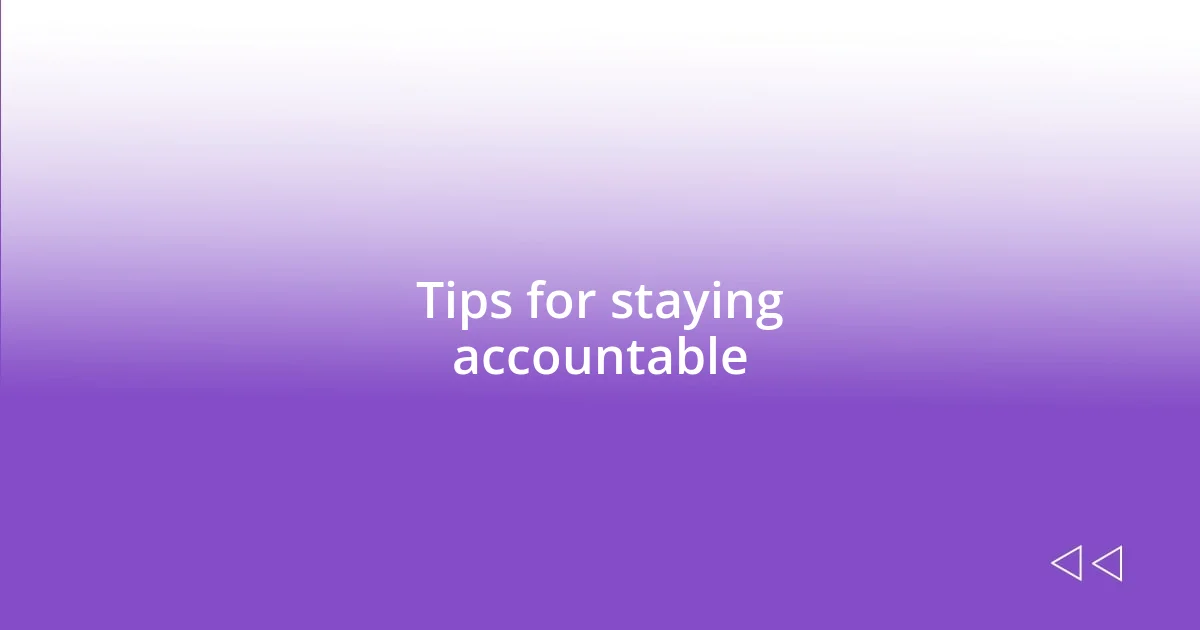
Tips for staying accountable
Staying accountable can feel like an uphill battle sometimes, especially when the motivation wanes. One technique I find particularly helpful is sharing my goals with someone I trust—a friend or a mentor. This simple act adds a layer of social pressure that keeps me on my toes. Have you ever shared your aspirations with someone only to find yourself working harder to meet their expectations? It’s a powerful motivator!
Another method I use is establishing a regular check-in schedule, whether that’s weekly or bi-weekly. I’ve learned that having set times to review my progress creates a framework for reflection and adjustment. During these check-ins, I ask myself what worked well and what didn’t. How often do we take a moment to stop and evaluate our journey? Taking the time to assess my strategies ensures I stay focused and intentional about my actions.
Finally, I’ve found that using a habit tracker empowers me to visualize my progress. As someone who enjoys visuals, seeing my streaks displayed on the screen gives me a satisfying sense of achievement. It’s interesting how these small markers can celebrate progress and promote further commitment. Whether it’s an app or a simple notebook, what I’ve encountered is clear: tracking my habits leads to a greater sense of accountability and accomplishment. Do you track your progress? You might just find it elevates your commitment!
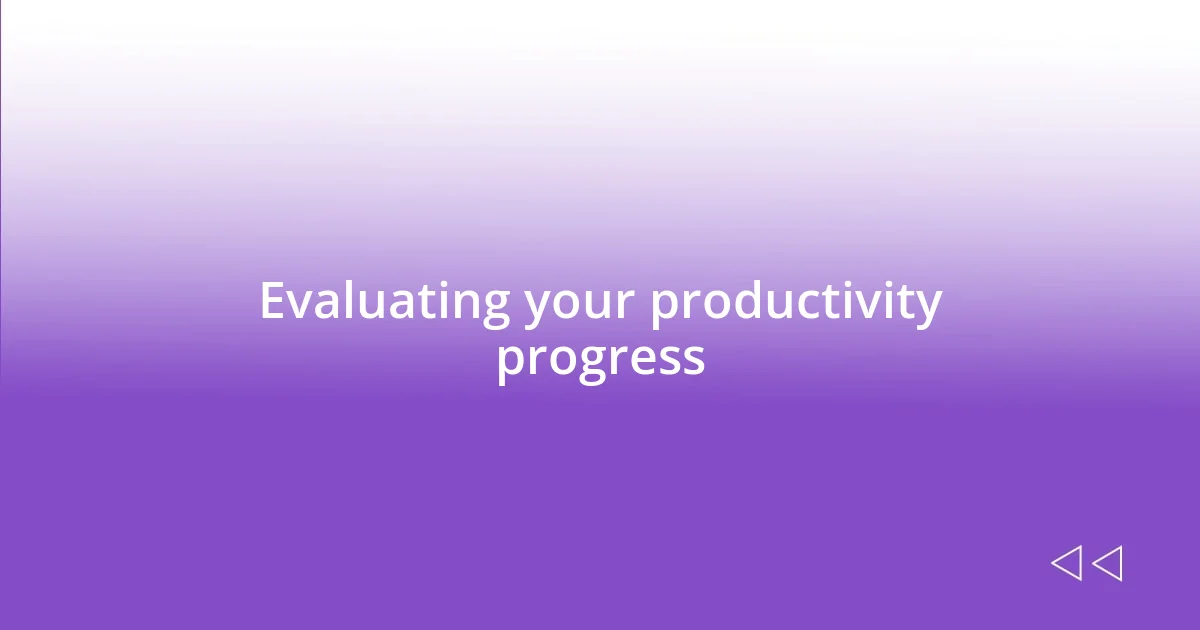
Evaluating your productivity progress
Evaluating your productivity progress is essential to understand what’s working and what isn’t. I remember when I first started using productivity trackers; I was amazed at how different my perception of my efficiency was compared to the actual time spent on tasks. Have you ever had a moment where the numbers surprised you? That’s when I realized I needed to adjust the way I approached my work.
As I reflected on my progress, it became clear that celebrating small wins was just as crucial as analyzing setbacks. I once jotted down every single task completed at the end of a day, no matter how trivial. Seeing that list grow was incredibly motivating. Don’t you think there’s a sense of pride in acknowledging even the smallest achievements? This practice often rekindled my enthusiasm for larger projects on my plate.
Lastly, I’ve found that revisiting my goals regularly helps me recalibrate my focus. There were times I set ambitious targets, only to realize they felt overwhelming. When I broke them down and assessed my progression, I felt a sense of control. How do you stay aligned with your objectives? For me, it’s about being flexible enough to pivot while still moving forward, ensuring I stay on track without feeling lost in the details.














